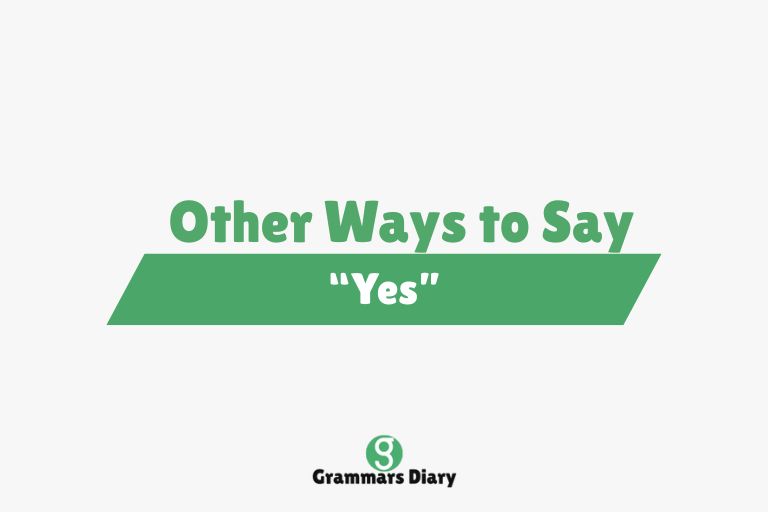“Yes” is one of the most universally recognized words in the English language, often used to express agreement, acceptance, approval, or willingness to comply. Whether you’re confirming a plan, agreeing to a request, or granting permission, saying “yes” is a natural and frequent part of everyday communication.
However, repeating the same word over and over can make your speech or writing feel monotonous or lack nuance. Thankfully, English offers a rich variety of alternatives to “yes,” each with its own subtle tone, degree of formality, or emphasis, allowing you to respond in a way that best suits your situation—whether you’re in a professional setting, chatting with friends, or simply looking to sound more expressive and confident.
This article will explore a collection of alternatives to “yes,” complete with meanings, example sentences, and usage tips, so you can expand your vocabulary and respond with more variety and clarity in any context.
Other Ways to Say “Yes”
1. Absolutely
Example: “Are you coming to the meeting?” – “Absolutely.”
Meaning: Expresses complete agreement or certainty; emphasizes enthusiastic or unqualified affirmation.
Usage: Ideal for both casual and professional contexts when you want to show strong support or commitment to something.
2. Certainly
Example: “Can I schedule a call with you tomorrow?” – “Certainly.”
Meaning: A polite and confident way to agree; shows a willingness to cooperate.
Usage: Frequently used in customer service or formal discussions when offering assistance or confirming a request.
3. Of course
Example: “Would you mind helping me with this project?” – “Of course.”
Meaning: Indicates willingness or eagerness to help; often used to express that the answer is obvious or expected.
Usage: Common in both formal and informal situations, especially when agreeing to a favor or confirming a shared understanding.
4. Sure
Example: “Do you want to grab lunch later?” – “Sure.”
Meaning: A relaxed, casual way to agree or give permission.
Usage: Perfect for everyday conversations among friends, family, or coworkers.
5. Definitely
Example: “Are you going to the party this weekend?” – “Definitely.”
Meaning: Adds a sense of confidence and assurance to your response.
Usage: Informal or semi-formal settings, often used when you want to leave no room for doubt.
6. Indeed
Example: “Was it a difficult challenge?” – “Indeed, it was.”
Meaning: A formal or emphatic way of saying yes, often used to confirm a statement.
Usage: More common in formal writing or polite conversation, especially when reinforcing someone else’s point.
7. Affirmative
Example: “Do you copy my last message?” – “Affirmative.”
Meaning: A formal or military-style word for “yes”; it confirms that something is understood or accepted.
Usage: Used in radio communication, the military, or technical contexts to show precision and formality.
8. Totally
Example: “Was that movie amazing or what?” – “Totally!”
Meaning: An informal, expressive way to agree enthusiastically.
Usage: Casual and popular among younger audiences or in friendly, energetic conversations.
9. Yup
Example: “Did you finish your homework?” – “Yup.”
Meaning: A casual, informal variation of “yes” that is friendly and relaxed.
Usage: Used in everyday speech among peers or close acquaintances, but not ideal in professional or formal scenarios.
10. Yeah
Example: “You ready to go?” – “Yeah.”
Meaning: Another informal version of “yes,” often used in spoken English.
Usage: Suitable for casual settings and conversations, but should be avoided in writing or formal situations.
11. Aye
Example: “All those in favor?” – “Aye.”
Meaning: A formal or parliamentary word for “yes,” traditionally used in voting or declarations.
Usage: Still used in formal voting procedures or to sound historical or official.
12. I do
Example: “Do you take this person as your spouse?” – “I do.”
Meaning: A solemn and formal affirmation, most notably used in wedding vows.
Usage: Limited to ceremonial or legal contexts, especially where agreement is formalized verbally.
13. Agreed
Example: “We should start earlier to avoid traffic.” – “Agreed.”
Meaning: Expresses harmony with a suggestion or opinion; confirms shared understanding.
Usage: Useful in discussions, debates, or decision-making settings to indicate alignment.
14. You bet
Example: “Can I count on you for support?” – “You bet.”
Meaning: An enthusiastic and confident yes, suggesting reliability or certainty.
Usage: Common in informal American English, especially when assuring someone or expressing eagerness.
15. Roger
Example: “Please report back at 0900 hours.” – “Roger.”
Meaning: A military or aviation term for acknowledging a message; indicates understanding and agreement.
Usage: Mostly used in radio or technical communication, though sometimes used humorously in casual contexts.
16. Right on
Example: “They’re finally raising awareness about the issue.” – “Right on.”
Meaning: Expresses strong agreement or approval, especially with a cause or opinion.
Usage: Informal and expressive, often used in supportive or enthusiastic conversations.
When to Use Different “Yes” Alternatives
In Professional Settings
In the workplace, clarity and respect are essential, so alternatives like “certainly,” “agreed,” or “affirmative” often carry the right tone of professionalism, helping you express agreement without sounding too casual or overly emotional, which can be especially important in client interactions or formal presentations.
In Everyday Conversations
For relaxed discussions with friends, family, or coworkers, informal expressions like “sure,” “yeah,” “yup,” or “you bet” feel natural and help keep the conversation light and friendly, making them ideal for day-to-day interactions that don’t require strict politeness or formality.
In Formal or Polite Interactions
When speaking to someone in a position of authority, or when courtesy is key—such as during an interview, customer service interaction, or a polite debate—phrases like “of course,” “certainly,” or “indeed” offer a polished and respectful alternative to a simple “yes.”
Conclusion
While “yes” is a perfectly acceptable word in almost every context, having a broader vocabulary of alternatives can help you sound more thoughtful, intentional, or appropriate depending on the situation. Whether you’re aiming for a more polished tone in professional settings, a more expressive voice in casual chats, or just looking to avoid repetition in your writing, using different ways to say “yes” empowers you to communicate with nuance and confidence.
To explore even more variations and expressions, online resources like Thesaurus.com can serve as an excellent guide for expanding your vocabulary with accurate and relevant synonyms.
FAQs
What does “yes” mean in communication?
“Yes” signals agreement, acceptance, or willingness to participate or comply with a statement, request, or proposal.
Is “yes” too casual for professional use?
While “yes” is widely acceptable, alternatives like “certainly,” “affirmative,” or “indeed” may sound more professional in formal communication.
Can I use “yeah” in a business email?
It’s best to avoid informal terms like “yeah” in emails or official correspondence—opt for “yes,” “certainly,” or “agreed” for a more appropriate tone.
What’s the difference between “sure” and “absolutely”?
“Sure” is casual and agreeable, while “absolutely” carries stronger emphasis and can suggest full confidence or enthusiasm.











